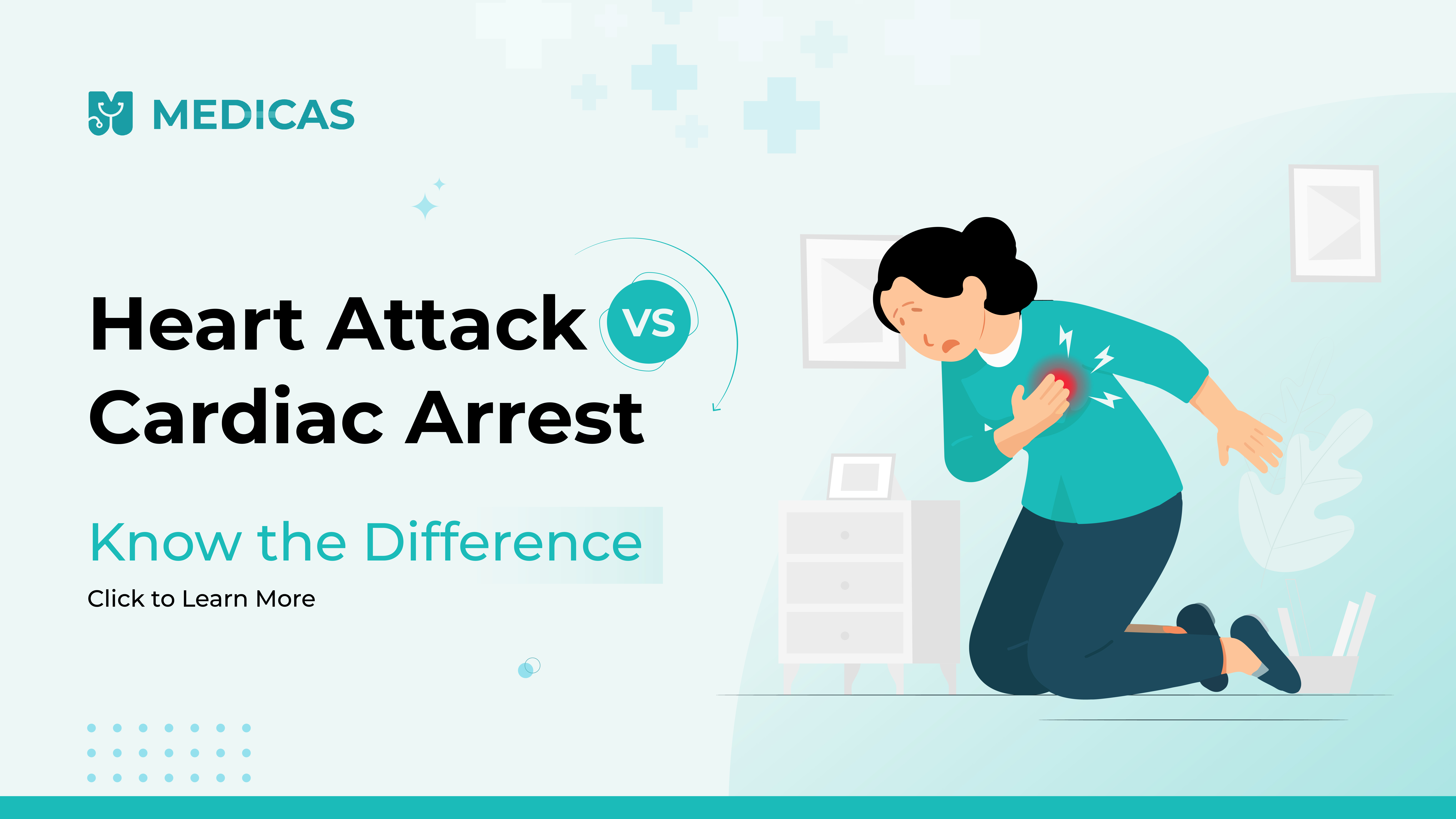When it comes to heart-related emergencies, the terms “cardiac arrest” and “heart attack” are often used interchangeably. However, they refer to two distinct medical conditions, each with its own causes, symptoms, and treatments. Understanding the differences between cardiac arrest and heart attack can be crucial in responding effectively and potentially saving lives. Let’s dive into the details of these critical health issues.
What is Heart Attack?
A heart attack, medically termed as myocardial infarction, happens when blood flow to a section of the heart muscle is obstructed.This blockage is maybe typically due to a buildup of plaque (a mixture of fat, cholesterol, and other substances) in the coronary arteries, which supply blood to the heart. When the plaque ruptures, it may form a clot that obstructs the artery, depriving the heart muscle of oxygen and nutrients.
Symptoms of Heart Attack
Symptoms of a heart attack can differ among individuals, but common signs include:
- Chest pain or discomfort, often characterized as pressure, squeezing, or a sensation of fullness
- Pain/discomfort in the stomach, arms, back, neck or jaw
- Shortness of breath
- Sweating
- Nausea or vomiting
- Lightheadedness or dizziness
Treatment for Heart Attack
Immediate treatment is critical to restore blood flow to the heart. This may include:
- Medications to dissolve blood clots
- Drugs to prevent further clotting
- Procedures like angioplasty and stenting may be required
- In serious instances, coronary artery bypass surgery might be required.
What is Cardiac Arrest?
Cardiac arrest, on the other hand, refers to a sudden stoppage of heart activity. This happens when the heart’s electrical system doesn’t work properly, leading to an irregular heartbeat.The most common arrhythmia in cardiac arrest is ventricular fibrillation, where the heart’s lower chambers quiver instead of contracting effectively. This prevents the heart from pumping blood to the rest of the body, including the brain and lungs.
Symptoms of Cardiac Arrest
Cardiac arrest happens suddenly and without warning. Symptoms may include:
- Sudden collapse
- No pulse
- No breathing
- Loss of consciousness
Treatment for Cardiac Arrest
Cardiac arrest requires immediate medical attention. Key steps may include:
- Calling emergency services immediately
- Performing CPR (cardiopulmonary resuscitation): Chest compressions can help maintain blood flow to vital organs until professional help arrives.
How to Differentiate the Symptoms Between Cardiac Arrest and Heart Attack?
Here’s a quick table to differentiate the symptoms:
| Feature | Heart Attack | Cardiac Attack |
| Consciousness | May be alert or disoriented | Loses consciousness quickly |
| Pulse | Weak or irregular | No pulse |
| Chest pain | Common, but not always | Less common |
| Breathing | May be labored | Stops breathing |
What are the Key Differences Between Heart Attack and Cardiac Arrest?
- Cause:
- Heart Attack: A heart attack is caused by a blockage in the coronary arteries.
- Cardiac Arrest: Caused by an electrical malfunction in the heart.
- Symptoms:
- Heart Attack: Often accompanied by chest pain, shortness of breath, and other symptoms.
- Cardiac Arrest: This may lead to sudden collapse, no pulse, and loss of consciousness.
- Onset:
- Heart Attack: Symptoms may appear gradually or suddenly.
- Cardiac Arrest: Occurs abruptly and without warning.
- Treatment:
- Heart Attack: Focuses on ensuring that blood reaches the heart properly.
- Cardiac Arrest: Requires immediate CPR.
Key Similarities Between Heart Attack and Cardiac Arrest
- Medical Emergencies: Both conditions are life-threatening and require immediate medical attention.
- Possible Overlap: A heart attack can sometimes trigger a cardiac arrest.
- Prevention: Healthy lifestyle choices, such as a balanced diet, regular exercise, and avoiding smoking, can reduce the risk of both conditions.
Conclusion
Both cardiac arrest and heart attack are serious medical emergencies that require prompt action. Understanding the differences between the two can help you respond appropriately in an emergency. Additionally, knowing how to consult a doctor online can provide timely medical advice and support, enhancing your ability to respond to heart emergencies effectively.
Staying informed and prepared can be crucial. By learning more about heart health and emergency response, you can help save lives and improve outcomes for those experiencing these critical conditions.
Other Healthcare Blogs:
What is the Difference between Heartburn and Heart Attack?
Dr. Shruti Goswami’s “Top 10 Tips for Healthy Living” (Download the FREE PDF!)
Say Goodbye to Waiting: How Consult Now 24/7 is Revolutionizing Healthcare Access
Healthcare at Your Fingertips: The Advantages of Instant Online Doctor Consultation Services
Disclaimer:
Medical Advice: The information provided in this blog post is for educational purposes only and should not be considered as a substitute for professional medical advice, diagnosis, or treatment. Always consult with a qualified healthcare professional for personalized guidance regarding your specific medical condition.
Accuracy of Information: While we strive to provide accurate and up-to-date information, the field of medicine and viral fevers is constantly evolving. The content in this blog post may not reflect the most current research or medical guidelines. Therefore, it is advisable to cross-check any information provided with reliable sources or consult a healthcare professional.
Individual Variations: The symptoms, causes, treatment options, and preventive measures discussed in this blog post are general in nature and may not apply to everyone. It is important to remember that each individual’s situation is unique, and personalized medical advice should be sought when making healthcare decisions.
External Links: This blog post may contain links to external websites or resources for additional information. However, we do not endorse or have control over the content of these third-party websites. Accessing these links is done at your own risk, and we are not responsible for any consequences or damages that may arise from visiting these external sources.
Results May Vary: The effectiveness of treatment options or preventive measures mentioned in this blog post may vary from person to person. What works for one individual may not work the same way for another. It is essential to consult with a healthcare professional for personalized advice tailored to your specific needs.

Dr. Murali serves as the Chief Medical Officer at EGS Health, bringing over 18 years of experience as a general practitioner to his role. He also directs Special Projects & Development at the Central America Health Sciences University, Belize Medical College. Dr. Murali holds an MD and a PG Cert in Health Profession Education (HPE) and has been an active contributor to the medical field since 2001. His career began in the Tobacco Cessation Program and the Border Family Welfare Programs in conjunction with PAHO in Ciudad Juarez, where he also published research on the impact of technology on healthcare education. He later became a clinical coordinator for clerkships, forging partnerships between students and hospitals that now serve as clinical sites for the university. Dr. Murali has furthered his expertise through advanced training, including the Leaders in Healthcare Education course at Harvard Macy Institute and the Health Professions Certification Program at Keele University, enhancing his influence in both medical education and healthcare delivery, both locally and internationally.


